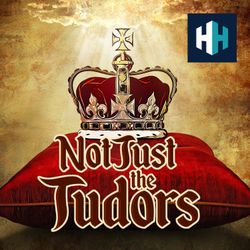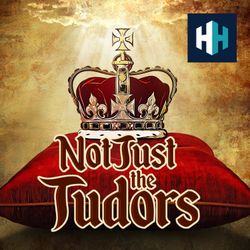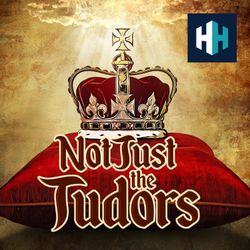Share

Not Just the Tudors
The Founding of Jamestown
415 years ago this month, 104 English men and boys landed in North America and established a settlement they called Jamestown in Virginia. Over the course of the 17th Century, a third of a million people left England for the "New World". But in Virginia, it all started from very small beginnings and there was every chance that this venture - like every previous attempt to settle in America would fail. In fact it almost did.
To learn about the first few years of Jamestown - which includes the true story of Matoaka (better known as Pocahontas) and her marriage to the tobacco cultivator John Rolfe - Professor Suzannah Lipscomb talks to Dr. Misha Ewen, author of the forthcoming book, The Virginia Venture: American Colonization and English Society, 1580-1660.
Keep up to date with everything early modern, from Henry VIII to the Sistine Chapel with our Tudor Tuesday newsletter >
If you would like to learn more about history, we have hundreds of history documentaries, ad-free podcasts and audiobooks at History Hit >
To download, go to Android > or Apple store >
More episodes
View all episodes

507. Queen Mary II & the Glorious Revolution
53:50||Ep. 507What does it take to rule as an equal in a man's world? How did a quiet, devout queen help reshape Britain’s monarchy forever?All this month, Professor Suzannah Lipscomb is exploring the Restoration monarchs. In this episode, she focuses on Queen Mary II, England’s first and only joint sovereign, who ruled alongside her husband William of Orange. Far from being a passive partner, Mary was politically astute, deeply devout, and a formidable cultural influence, playing a pivotal role in forging Britain’s constitutional monarchy. Dr Holly Marsden joins Suzannah to examine Mary II’s reign and why her story still resonates in the histories of Britain, gender, and political revolution.MORE:William III & the Persecution of SodomitesListen on AppleListen on SpotifyThe Massacre of GlencoeListen on AppleListen on SpotifyPresented by Professor Suzannah Lipscomb. The researcher is Max Wintle, audio editor is Amy Haddow and the producer is Rob Weinberg. The senior producer is Anne-Marie Luff.All music courtesy of Epidemic Sounds.Not Just the Tudors is a History Hit podcastSign up to History Hit for hundreds of hours of original documentaries, with a new release every week. Sign up at https://www.historyhit.com/subscribe.
506. True Crime: The Lynching of the "Duke's Devil"
58:28||Ep. 506This episode contains discussions of sexual assault, violence and child abuse. Listener discretion is advised. How did the mob lynching of a notorious astrologer and occultist in June 1628 act as a grim prelude to the demise of King Charles I? Why did John Lambe - accused of witchcraft, sorcery, and moral corruption - become the target for popular anger at a monarchy seen as distant, corrupt, and unaccountable?Professor Suzannah Lipscomb is joined by Professor Alastair Bellany to uncover how witchcraft accusations became political weapons, and how the killing of one man revealed a terrifying truth: royal authority in England was beginning to fail.MORE:Tudor True Crime: Murder in the Stuart CourtListen on AppleListen on SpotifyGiordano Bruno: Mystic, Heretic, SpyListen on AppleListen on SpotifyPresented by Professor Suzannah Lipscomb. The researcher is Max Wintle, audio editor is Amy Haddow and the producer is Rob Weinberg. The senior producer is Anne-Marie Luff.All music courtesy of Epidemic Sounds.Not Just the Tudors is a History Hit podcastSign up to History Hit for hundreds of hours of original documentaries, with a new release every week and ad-free podcasts. Sign up at https://www.historyhit.com/subscribe.
505. James II: The Restoration's Last Catholic King
52:28||Ep. 505A king with unyielding faith. A nation on the brink. A crown lost to revolution.King James II is often dismissed as the unfortunate monarch swept aside by William and Mary. But behind the Glorious Revolution lies a story of ambition, devotion, and downfall more dramatic than legend would suggest.Professor Suzannah Lipscomb joins Dr. Breeze Barrington to uncover the man behind the myth. Was James a tyrant blinded by belief, or a visionary undone by his own time?MORE:The Restoration Queen: Maria of ModenaListen on AppleListen on SpotifyDiary of Samuel PepysListen on AppleListen on SpotifyPresented by Professor Suzannah Lipscomb. The researcher is Max Wintle. Edited and produced by Rob Weinberg. The senior producer is Anne-Marie Luff.All music courtesy of Epidemic Sounds.Not Just the Tudors is a History Hit podcastSign up to History Hit for hundreds of hours of original documentaries, with a new release every week. Sign up at https://www.historyhit.com/subscribe
504. Katherine Howard's Deadly Affairs
55:22||Ep. 504Was Henry VIII's fifth wife a promiscuous teenager and then heartless adulteress and schemer? Celebrated, scrutinised, and endlessly talked about at court, Katherine Howard’s reign was dazzlingly brief; within two years of marrying the king, she was accused of adultery and treason and executed.Professor Suzannah Lipscomb is joined by Gareth Russell and Dr Nicola Clark to get to know the real young woman who was plucked from obscurity, whose life was cut short by the unforgiving power politics of Tudor England.MORE:Anne Boleyn’s Final YearListen on AppleListen on SpotifyAnne Boleyn & Katherine Howard's Uncle, Thomas HowardListen on AppleListen on SpotifyPresented by Professor Suzannah Lipscomb. Edited and produced by Rob Weinberg. The senior producer is Anne-Marie Luff.All music courtesy of Epidemic Sounds.Not Just the Tudors is a History Hit podcastSign up to History Hit for hundreds of hours of original documentaries, with a new release every week. Sign up at https://www.historyhit.com/subscribe.
503. Charles II: Restoration of the Monarchy
56:56||Ep. 503From clinging to a tree while evading capture, his face blackened with soot, to triumphantly sailing home to reclaim his crown — the story of Charles II is one of survival, spectacle, and transformation. Professor Suzannah Lipscomb guides us through the Restoration, tracing life in England from the shadow of civil war to the glittering courts of Restoration London, and discovers how intrigue, scandal, plague, and fire gave rise to an age of theatre, science, and unfettered pleasure. MORE:Nell Gwyn: Actress and Royal MistressListen on AppleListen on SpotifyIsaac Newton: The Man at the Centre of GravityListen on AppleListen on SpotifyPresented by Professor Suzannah Lipscomb. Edited and produced by Rob Weinberg. The senior producer is Anne-Marie Luff.All music courtesy of Epidemic Sounds.Not Just the Tudors is a History Hit podcastSign up to History Hit for hundreds of hours of original documentaries, with a new release every week. Sign up at https://www.historyhit.com/subscribe.
502. Why Cromwell's Republic Failed
01:10:04||Ep. 502After the execution of King Charles I, England became a Republic for the only time in its history. Yet why was this revolutionary moment so short-lived? Why did Oliver Cromwell’s Commonwealth collapse?Professor Suzannah Lipscomb explores its rise and demise with a panel of expert historians: Professor Ronald Hutton, Dr. Jonathan Healey and Dr. Miranda Malins. Together they discuss what the Republic's failure reveals about authority, popular consent, and the enduring pull of monarchy in 17th-century Britain.MORE:The English Civil WarListen on AppleListen on SpotifyOliver Cromwell v. Charles IListen on AppleListen on SpotifyPresented by Professor Suzannah Lipscomb. The researcher is Max Wintle, audio editor is Amy Haddow and the producers are Fiona Turnock and Rob Weinberg. The senior producer is Anne-Marie Luff.All music courtesy of Epidemic Sounds.Not Just the Tudors is a History Hit podcastSign up to History Hit for hundreds of hours of original documentaries, with a new release every week. Sign up at https://www.historyhit.com/subscribe
501. "Bloody Mary": Debunking the Myths
52:38||Ep. 501Was Mary Tudor truly “Bloody Mary”? Has England’s first reigning queen been misunderstood for centuries? Determined to restore Roman Catholicism, her reign became forever associated with the burning of Protestants. But was she really a religious tyrant, or a trailblazer trapped by Europe's violent politics?Professor Suzannah Lipscomb is joined by Professor Anna Whitelock to put the record straight on the remarkable reign of Mary I, five turbulent years which shaped the future of England in profound, and often misrepresented, ways.MORE:Mary I: What if She'd Lived?Listen on AppleListen on SpotifyThe Spanish King of EnglandListen on AppleListen on SpotifyPresented by Professor Suzannah Lipscomb. The researcher is Max Wintle, audio editor is Amy Haddow and the producer is Rob Weinberg. The senior producer is Anne-Marie Luff.All music courtesy of Epidemic Sounds.Not Just the Tudors is a History Hit podcastSign up to History Hit for hundreds of hours of original documentaries, with a new release every week. Sign up at https://www.historyhit.com/subscribe. Audio for Uploader:https://drive.google.com/drive/u/1/folders/1nNXk3BvoUew_hdGsSvuzaC6que5vao67
500. Ireland Under the Brutal Tudors
46:36||Ep. 500What impact did the Tudors have on Ireland, not just in the councils of kings and earls, but in the rhythms of ordinary life? What were the consequences for ordinary citizens when English power was asserted through martial law, low-level coercion and the constant threat of punishment?Professor Suzannah Lipscomb is joined by Dr David Edwards to discuss how communities were reshaped from the ground up.MORE:Ireland's Witchcraft TrialsListen on AppleListen on SpotifyTudor Conquest of IrelandListen on AppleListen on SpotifyPresented by Professor Suzannah Lipscomb. The researcher is Max Wintle, audio editor is Amy Haddow and the producer is Rob Weinberg. The senior producer is Anne-Marie Luff.All music courtesy of Epidemic Sounds.Not Just the Tudors is a History Hit podcastSign up to History Hit for hundreds of hours of original documentaries, with a new release every week. Sign up at https://www.historyhit.com/subscribe.
499. Elizabeth I's Doctor - & Poisoner?
48:01||Ep. 499Why was a Portuguese-born Jewish doctor, who rose to become Elizabeth I’s chief physician, brutally executed for treason in a scandal that shocked England? Was Dr. Rodrigo Lopes truly guilty, or simply caught in the crossfire of anti-Semitism, court rivalries, and empire?Professor Suzannah Lipscomb is joined by Dr. Samia Errazouki to reexamine Lopes’s fall, tracing a web of diplomacy, espionage, and identity that stretched from London to Lisbon to Marrakesh.MOREElizabeth I & the Sultan of MoroccoListen on AppleListen on SpotifyElizabeth I's Conjuror: John DeeListen on AppleListen on SpotifyPresented by Professor Suzannah Lipscomb. The researcher is Max Wintle, audio editor is Amy Haddow and the producer is Rob Weinberg. The senior producer is Anne-Marie Luff.All music courtesy of Epidemic Sounds.Not Just the Tudors is a History Hit podcastSign up to History Hit for hundreds of hours of original documentaries, with a new release every week. Sign up at https://www.historyhit.com/subscribe.